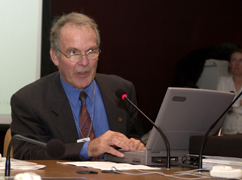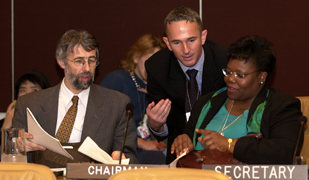New
partnerships to strengthen the
implementation of Agenda 21 |
Chair
Salim with Vice-Chair Jan Kara
 Chair Kara's introductory statement for the afternoon's
discussion
Chair Kara's introductory statement for the afternoon's
discussion
|
| |
 |
 Joshen Eigen, UN-Habitat, presented his organization's
achievements in the creation of sustainable urbanization partnerships.
Describing the logical framework and approach used to create them,
he said the goal was not to start new undertakings but to create
synergies among existing ones. After outlining the main challenges
to be addressed by the partnerships, he stated that UN Habitat
selected a few programmes that could be accelerated and intensified
in time for WSSD. He said that the unifying rationale was to concentrate
on the capacity-building needs of local actors, external sources
of support, and on the strategic funding that might be provided
by donors. Eigen said that the partnerships themselves could be
grouped into three closely-linked and related areas: decentralized
(city-to-city) capacity building, regional forums on capacity
building, and thematic contributions to capacity building. Outlining
the next steps, he highlighted the World Urban Forum, to be held
in Nairobi from 29 April-3 May, the revision of partnership implementation
planned for PrepCom-IV, and the separate parallel events for selected
coalition partners at WSSD.
Joshen Eigen, UN-Habitat, presented his organization's
achievements in the creation of sustainable urbanization partnerships.
Describing the logical framework and approach used to create them,
he said the goal was not to start new undertakings but to create
synergies among existing ones. After outlining the main challenges
to be addressed by the partnerships, he stated that UN Habitat
selected a few programmes that could be accelerated and intensified
in time for WSSD. He said that the unifying rationale was to concentrate
on the capacity-building needs of local actors, external sources
of support, and on the strategic funding that might be provided
by donors. Eigen said that the partnerships themselves could be
grouped into three closely-linked and related areas: decentralized
(city-to-city) capacity building, regional forums on capacity
building, and thematic contributions to capacity building. Outlining
the next steps, he highlighted the World Urban Forum, to be held
in Nairobi from 29 April-3 May, the revision of partnership implementation
planned for PrepCom-IV, and the separate parallel events for selected
coalition partners at WSSD.
|
|
|
 The Third World Network cautioned against lumping
all stakeholders together and called for deliverable results,
as well as a process and procedure for assessing what is sustainable.
She said Type I commitments must to be undermined. Regarding the
case study presentations, she said the Habitat initiative represented
a good example of what is being done at the local level. She expressed
deep concern with the initiative of CropLife International. In
conclusion, she stressed tapping the richness and diversity of
opinions and said that dealing with conflict is the way forward
and said that the UN and governments should play the role of arbiter.
The Third World Network cautioned against lumping
all stakeholders together and called for deliverable results,
as well as a process and procedure for assessing what is sustainable.
She said Type I commitments must to be undermined. Regarding the
case study presentations, she said the Habitat initiative represented
a good example of what is being done at the local level. She expressed
deep concern with the initiative of CropLife International. In
conclusion, she stressed tapping the richness and diversity of
opinions and said that dealing with conflict is the way forward
and said that the UN and governments should play the role of arbiter.
|
|
|
 South
Africa said that partnerships needed to recognize
the role of governments. Noting the lack of a common working definition
of partnerships, she suggested that they should be based on common
values and agreed goals. She concluded by proposing criteria for
the selection of partnerships to avoid duplication and lack of
coherence, including the criteria that there should be a balance
between poverty eradication and unsustainable consumption. South
Africa said that partnerships needed to recognize
the role of governments. Noting the lack of a common working definition
of partnerships, she suggested that they should be based on common
values and agreed goals. She concluded by proposing criteria for
the selection of partnerships to avoid duplication and lack of
coherence, including the criteria that there should be a balance
between poverty eradication and unsustainable consumption.
|
|
|
 A
representative of the Labor Community Strategy Center, Los Angeles
stated that it was symbolic that he be seated behind Samoa's plaque,
since it will be decisions made by residents of Los Angeles that
will decide the fate of that country. He stated that sustainability
can only be achieved if developed countries consume and produce
less, but these reductions cannot be arrived through voluntary partnership
- legally enforceable rules would be required. He expressed the
hope that governments will work with NGOs to enforce the notion
of corporate accountability. A
representative of the Labor Community Strategy Center, Los Angeles
stated that it was symbolic that he be seated behind Samoa's plaque,
since it will be decisions made by residents of Los Angeles that
will decide the fate of that country. He stated that sustainability
can only be achieved if developed countries consume and produce
less, but these reductions cannot be arrived through voluntary partnership
- legally enforceable rules would be required. He expressed the
hope that governments will work with NGOs to enforce the notion
of corporate accountability. |
|

Facilitators
Jan Kara (Czech Republic) and Diane Quarless
(Jamaica) speak with Crispian Olver from South Africa |
|
| |
 Annik
Dollacker, CropLife International,
introduced the initiative on "Promoting Capacity Building for
Sustainable Agriculture." She said that in the Asia Pacific Region,
CropLife has supported the development of the Asia Pacific Regional
Technology Center (APRTC), which has developed the agLearn Web-based
distance learning programme focused on the promotion of sustainable
agriculture. She said that, in light of the WSSD, CropLife was proposing
to explore ways to use this tool at the global level, mainly focusing
on developing countries, to reach more farmers. Regarding the relationship
with the objectives of Agenda 21 and the Millennium Declaration,
she said the initiative will promote sustainable agriculture practices
to professionals that work with smallholder farmers and other rural
development stakeholders in developing countries, resulting in improved
farming practices that minimize environmental impacts, while improving
agricultural productivity. She said some of the international development
targets tackled through the initiatives are: education, gender,
environment, health and sustainable development. She said the latter
requires a major contribution from SARD, particularly in terms of
poverty alleviation, food security and economic development of rural
areas. In conclusion, she said CropLife has started a collection
of case studies in developing multi-stakeholder approaches to public-private
cooperation to improve outreach in basic sustainable agricultural
techniques and knowledge to farmers with small-holdings and to the
rural poor, and is envisaging and developing a Type II initiative
in this area. Annik
Dollacker, CropLife International,
introduced the initiative on "Promoting Capacity Building for
Sustainable Agriculture." She said that in the Asia Pacific Region,
CropLife has supported the development of the Asia Pacific Regional
Technology Center (APRTC), which has developed the agLearn Web-based
distance learning programme focused on the promotion of sustainable
agriculture. She said that, in light of the WSSD, CropLife was proposing
to explore ways to use this tool at the global level, mainly focusing
on developing countries, to reach more farmers. Regarding the relationship
with the objectives of Agenda 21 and the Millennium Declaration,
she said the initiative will promote sustainable agriculture practices
to professionals that work with smallholder farmers and other rural
development stakeholders in developing countries, resulting in improved
farming practices that minimize environmental impacts, while improving
agricultural productivity. She said some of the international development
targets tackled through the initiatives are: education, gender,
environment, health and sustainable development. She said the latter
requires a major contribution from SARD, particularly in terms of
poverty alleviation, food security and economic development of rural
areas. In conclusion, she said CropLife has started a collection
of case studies in developing multi-stakeholder approaches to public-private
cooperation to improve outreach in basic sustainable agricultural
techniques and knowledge to farmers with small-holdings and to the
rural poor, and is envisaging and developing a Type II initiative
in this area. |
| |
 Chair Elim Salim
said that type two outcomes (public/private partnerships) were
linked with type one outcomes (implementation programme being negotiated
in the PrepCom), which together with a political message will form
the three types of outcomes from WSSD. He said that Type-II outcomes
were a unique opportunity for all stakeholders to take initiative
and participate in implementation of sustainable development. Using
the example of an integrated sustainable fisheries project, he said
that the partnerships need to be linked, and give substance, to
the Chairman's Paper and the goals of the Millennium Declaration.
He said that the partnerships must also be bottom-up in their approach,
and should ensure that WSSD is a summit of all stakeholders.
Chair Elim Salim
said that type two outcomes (public/private partnerships) were
linked with type one outcomes (implementation programme being negotiated
in the PrepCom), which together with a political message will form
the three types of outcomes from WSSD. He said that Type-II outcomes
were a unique opportunity for all stakeholders to take initiative
and participate in implementation of sustainable development. Using
the example of an integrated sustainable fisheries project, he said
that the partnerships need to be linked, and give substance, to
the Chairman's Paper and the goals of the Millennium Declaration.
He said that the partnerships must also be bottom-up in their approach,
and should ensure that WSSD is a summit of all stakeholders.
|
| |
|
 The
Netherlands underscored that the two tracks should
not be disconnected. He said that Type II commitments must fully
respect the outcomes of the Chairman's paper. He emphasized partnerships
related to water, energy, sustainable agriculture, health care
and urban poverty, and Africa. The
Netherlands underscored that the two tracks should
not be disconnected. He said that Type II commitments must fully
respect the outcomes of the Chairman's paper. He emphasized partnerships
related to water, energy, sustainable agriculture, health care
and urban poverty, and Africa.
|
|
|
 The
Stakeholder Forum said partnerships were a small piece
of the overall cake of Agenda 21 implementation. She stressed
the need to look at the linkages between Type I and Type II outcomes
and to look at criteria. She said the challenge of the outcome
package is to find a balance between authority and leadership,
and responsibility and broad stakeholder participation. The
Stakeholder Forum said partnerships were a small piece
of the overall cake of Agenda 21 implementation. She stressed
the need to look at the linkages between Type I and Type II outcomes
and to look at criteria. She said the challenge of the outcome
package is to find a balance between authority and leadership,
and responsibility and broad stakeholder participation.
|
| |
 Business
Action for Sustainable Development called for action and
deliverable results, and stressed that the initiatives should
be replicable, have measurable results, include the three pillars
of sustainable development and have multi-stakeholder involvement. Business
Action for Sustainable Development called for action and
deliverable results, and stressed that the initiatives should
be replicable, have measurable results, include the three pillars
of sustainable development and have multi-stakeholder involvement.
|
|

